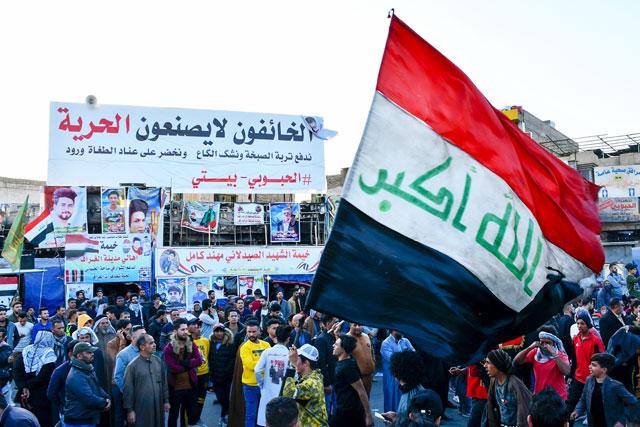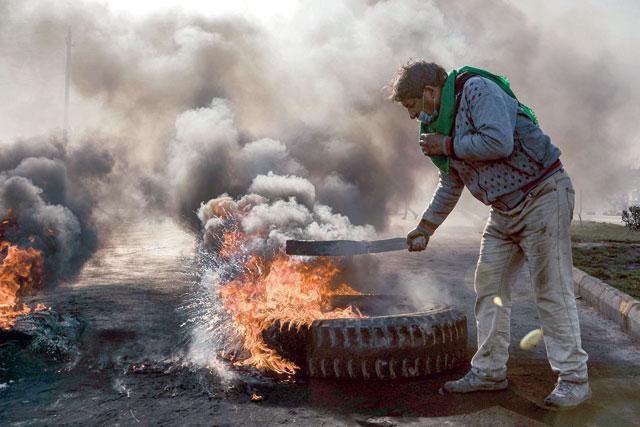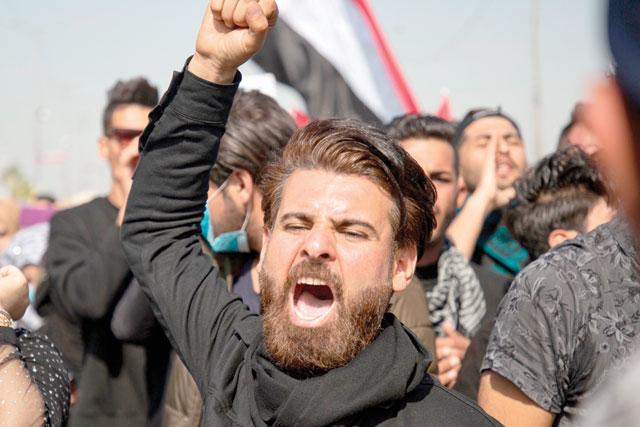You are here
Iraqi protesters dig in heels despite new PM-designate
By AFP - Feb 02,2020 - Last updated at Feb 02,2020

An Iraqi protester waves the national flag during a gathering, rejecting the nomination of Mohammad Allawi as premier, in the city of Nasiriyah in Iraq's southern Dhi Qar province, on Sunday (AFP photo)
BAGHDAD — Furious anti-government youth dug in their heels in Iraq's capital and south on Sunday, rejecting the previous evening's nomination of Mohammad Allawi as premier after months of demonstrations and political paralysis.
Allawi was named prime minister-designate after a hard-won consensus among Iraq's rival parties, who had struggled to agree on a candidate since outgoing premier Adel Abdel Mahdi resigned under growing street pressure two months ago.
Mass rallies have rocked Baghdad and the mainly-Shiite south since October, with protesters demanding snap elections and an independent prime minister as well as accountability for corruption and recent bloodshed.
Young demonstrators have expressed contempt for the ruling elite and on Sunday, they slammed Allawi — a former lawmaker and minister — as part and parcel of the system they want to overhaul.
"We are here to reject the new prime minister because he has a well-known history within the political class," said 22-year-old university student Tiba protesting in Baghdad.
Hundreds of students flooded the streets around the capital's main protest camp of Tahrir Square, carrying pictures of Allawi with an "X" over his face.
They blared upbeat Arabic music through speakers, trying to drown out the somber Islamic hymns played by demonstrators loyal to populist cleric Moqtada Sadr.
Sadr backed the protests in October but has split with the main movement over Allawi, whose designation he welcomed as a “good step”.
After his endorsement, Sadr’s supporters — identifiable by their blue caps — rushed into the multistorey building known as the Turkish restaurant.
The structure had become a symbol of the uprising, featuring portraits of young men shot dead in the rallies and huge banners listing reforms protesters wanted to see.
By Sunday, those banners were gone and Sadr posted new tweets condemning student sit-ins and road closures — the two main tactics used by anti-government demonstrators.
“The revolution must go back to being restrained and peaceful,” Sadr wrote on Twitter.
Despite his appeal, angry protesters in the holy city of Najaf blocked roads with burning tyres and held up a sign that read, “Mohammad Allawi is rejected, by order of the people!”
In Diwaniyah, further south, protesters marched into government buildings to demand they close for the day while students began sit-ins at schools and universities.
“Naming Mohammad Allawi is a mockery,” one demonstrator there told AFP.
“It represents a total disregard for those killed in the protests and for the demands of the Iraqi people who have been demonstrating for four months to reject parties affiliated with Iran,” the demonstrator said.
In addition to their calls for better services and an end to government graft, demonstrators have accused Iraq’s ruling elite of being beholden to powerful neighbour Iran.
Tehran has seen its influence grow in Iraq since the US-led invasion that toppled ex-dictator Saddam Hussein in 2003.
Allawi, 65, launched his political career in the aftermath of the invasion, first as a parliamentarian and then twice as communications minister under former premier Nuri Al Maliki.
But he resigned both times, accusing Maliki of turning a blind eye to graft in a country considered among the top 20 most corrupt in the world by Transparency International.
His appointment came after days of crisis talks prompted by President Barham Saleh, who said he would select his own candidate if Iraq’s parliamentary blocs did not nominate someone by Saturday.
The negotiations were very secretive and it remains unclear what finally unlocked a deal, but on Saturday evening Allawi announced his own nomination in a video posted to Twitter.
There was no official statement from Saleh, but Abdel Mahdi congratulated his successor and the pair pledged to meet soon to ensure a smooth transition.
In his first public remarks, Allawi vowed to form a representative government, hold early parliamentary elections and ensure justice for protest-related violence.
More than 480 people have died and nearly 30,000 have been wounded since the rallies began on October 1, but few have been held accountable for the bloodshed.
Allawi has one month to form a government, but ensuring an independent line-up may prove a challenge, said Sajad Jiyad of the Iraq-based think tank the Bayan Centre.
“If we’ve learned anything from the previous PM, it’s that this is the most difficult part: Pushing back against the political blocs’ demands,” Jiyad told AFP.
In Iraq, Cabinets are typically formed after complex horsetrading whereby parties demand lucrative and influential ministerial posts based on their share of parliament.
If Allawi fails to resist ministerial candidates proposed by parties, “it will back up what protesters are saying” about his allegiance to the factions, Jiyad added.
Related Articles
BAGHDAD — Protest camps across Iraq began fracturing on Monday into separate clusters over whether to back premier-designate Mohammad Allawi
BAGHDAD — A demonstrator was shot dead near the Iraqi capital's main protest camp by unidentified attackers using a gun silencer, medics sai
NAJAF, Iraq — Young Iraqi protesters pushed on with anti-government rallies across the country on Thursday as they buried seven fellow activ


















